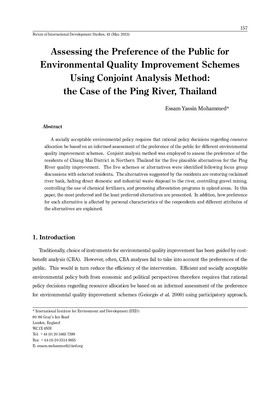Assessing the Preference of the Public for Environmental Quality Improvement Schemes Using Conjoint Analysis Method: the Case of the Ping River, Thailand

A socially acceptable environmental policy requires that rational policy decisions regarding resource allocation be based on an informed assessment of the preference of the public for different environmental quality improvement schemes. Conjoint analysis method was employed to assess the preference of the residents of Chiang Mai District in Northern Thailand for the five plausible alternatives for the Ping River quality improvement. The five schemes or alternatives were identified following focus group~discussions with selected residents. The alternatives suggested by the residents are restoring reclaimed river bank, halting direct domestic and industrial waste disposal to the river, controlling gravel mining, controlling the use of chemical fertilizers, and promoting afforestation programs in upland areas. In this paper, the most preferred and the least preferred alternatives are presented. In addition, how preference for each alternative is affected by personal characteristics of the respondents and different attributes of the alternatives are explained.